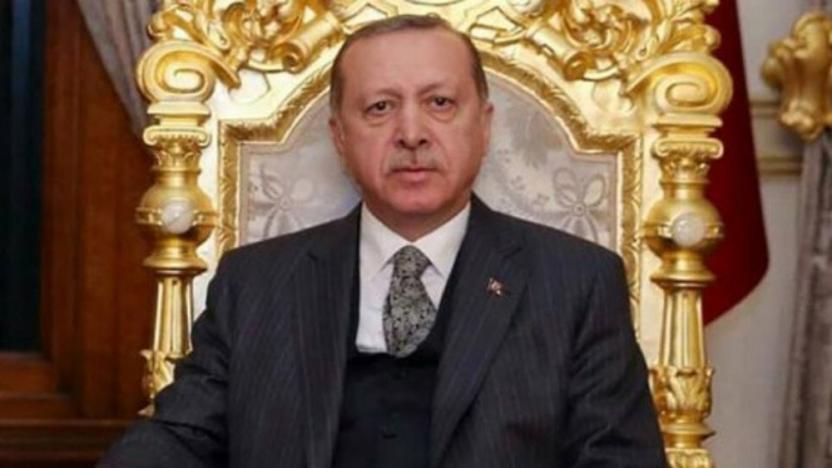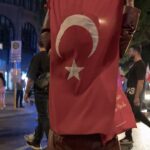When the Justice and Development Party (AKP) came into power in 2002, its goal was to make Turkey an upper-middle-income conservative democracy. Since then, many things have changed in the country, yet not in the initially desired direction. Firstly, the country’s fragile democracy has inexorably turned into a presidential autocracy. The executive holds unchecked and asymmetrical powers vis-à-vis the Parliament and the judiciary. Secondly, Islam has expanded into different realms of public life, casting doubt on the republic’s secular credentials. Thirdly, despite continuous growth, the Turkish economy is being challenged by increasing income inequality and brain drain. Overall, there is a growing mismatch between the ruling elites’ rhetoric on a “prosperous, strong and confident Turkey”[1] and the everyday experiences of citizens. Whether this gap will change the electoral dynamics at the national level and lead to an opposition victory is unclear.
Concentration of Income at the Top
Since the AKP assumed power in 2002, Turkey’s GDP has increased from US$415 billion to US$1.19 trillion (2022).[2] Similarly, per capita GDP has doubled during this timeframe, rising from US$6,291 to US$14,055.[3] These figures reflect tangible developments evident in daily life, such as modern infrastructure, including highways, upscale shopping centres, a burgeoning service sector and technology-driven events.
However, a more complicated picture lies beneath the impressive-sounding figures and apparent prosperity. GDP growth exhibited non-linearity throughout the period, with a pronounced decline between 2004 and 2009, followed by a sharp upturn until 2011.[4] Subsequently, growth rates have oscillated, reaching a peak of 11.4 percent in 2021.[5] Despite this intermittent economic expansion, the momentum in poverty reduction has faltered since 2016. Moreover, high inflation, declining labour income as a share of GDP, and a notable surge in net profits have exacerbated income inequality.[6]
A closer examination of income distribution reveals significant shifts, particularly since 2020.[7] With the exception of the top 20 percent, each income group has experienced a noticeable decline in their share of total income. The income share ratio of the wealthiest 20 percent to the poorest 20 percent has increased from 7.8 percent to 8.4 percent. In 2022, the top 10 percent of earners held 34.6 percent of the national income, nearly doubling the share of the second richest decile (15.1 percent). Remarkably, while the share of the second top decile remained stable between 2017 and 2022, the ratio increased by three percentage points for the top 10 percent, highlighting a widening income disparity even within the high-income group. In 2021, Turkey had the fourth-highest Gini coefficient among the OECD countries, behind Costa Rica, Chile and Mexico.
Amidst escalating economic challenges, the past few years have seen a notable increase in brain drain, coupled with a rise in irregular migration from Turkey
Middle-Class Erosion?
Amidst escalating economic challenges, the past few years have seen a notable increase in brain drain, coupled with a rise in irregular migration from Turkey.[8] 44.9 percent of the population is under the age of 30, and 22.9 percent is between the ages of 15 and 29.[9] Recent reports indicate a growing trend of students from leading high schools opting to pursue higher education abroad.[10] According to the Turkish Youth Study 2023 by Konrad Adenauer Stiftung, a striking 63 percent of respondents expressed a desire to relocate abroad, predominantly driven by economic motives (47.8%).[11] Notably, in 2022, 27.9 percent of individuals aged 15 to 29 were neither employed, in education nor in training – a figure significantly higher than the OECD average of 12.6 percent.[12]
For many young individuals, the outlook for a stable and prosperous future appears bleak. Disparities begin early in the education system. Ministry of Education data reveals a consistent increase in the number of private schools across all levels, including pre-school, since the 2012/13 academic year.[13] This surge follows the introduction of the 4+4+4 system, which transitioned compulsory education from an uninterrupted eight-year primary school period to an intermittent structure, mandating secondary schooling, yet offering the option of distance education. The new system also re-introduced vocational schools alongside religious Imam Hatip schools as secondary education options. Notably, the number of Imam Hatip schools offering secondary education surged from 1,099 in 2012/13 to 3,451 by 2021/22.[14]
Raising Pious Generations
The surge in religious schools reflects a broader trend of “stealth Islamization.”[15]
The gradual integration of Islam into daily life is most evident in the realms of education and family
President Recep Tayyip Erdogan has repeatedly expressed his ambition to cultivate pious generations as the foundational basis of a “new Turkey.” Coined by Erdogan in 2014 after his election to the presidency, the AKP leadership promotes the view that “a (postcolonial) new subjectivity is being created through ‘new Turkey’.”[16] This vision emphasizes drawing strength from authentic Turkish values and local knowledge, striving for independence (particularly from Western influence), and advancing the nation with confidence.
The gradual integration of Islam into daily life is most evident in the realms of education and family. Alongside the proliferation of Imam Hatip schools, religion-based selective courses have been introduced. In 2017, the theory of evolution was removed from school curricula due to its perceived misalignment with Turkish cultural values. Additionally, Islamic brotherhoods have collaborated with the Ministry of Education under the “Value Education” programme.
In accordance with its increasing salience and dominance in regulating the religious realm, Diyanet, the Turkish Directorate of Religious Affairs, has assumed a prominent role as an arbiter and regulator in family-related matters. Family and Religious Guidance Offices, established in 2003, offer guidance on family and religious issues and mediate conflicts within families, particularly between spouses. Women are viewed as pivotal figures, fulfilling roles as mothers and spouses, in promoting and perpetuating piety. Such conservative morality underscoring family as the cornerstone of society is advocated as a defence against perceived identity threats posed by secular lifestyles, as interpreted by the ruling elite.[17] Notably, secularization has been identified as a societal risk in Diyanet’s strategic plan for 2024-2028.[18]
The Secular Backlash
Diyanet bureaucrats might not be entirely wrong in their assessment. Already in 2018, participants at a workshop organized by the Ministry of Education office in Konya, one of the AKP strongholds in Central Anatolia, concluded that deism had been on the rise among students of Imam Hatip schools.[19] According to a recent survey conducted in Istanbul by the polling company KONDA, six percent of those surveyed identified themselves as atheists, and another four percent non-believers. Another survey conducted by the same company in 2018 found that 5% of respondents did not associate themselves with any belief system.[20]
While polls can sometimes be misleading due to varying interpretations of belief and faith categories, publicly available journalistic reports suggest a noticeable reactionary trend in children of conservative and devout families.[21] The vast majority of Turkey’s population resides in urban areas. Specifically, the top five metropolitan cities, which include Istanbul and Ankara, account for 37.32% of the total population.[22] This urban demographic includes a significant portion of youth who face both abundant opportunities in a consumer-driven society and economic challenges.
The secular backlash also reflects discontent with the AKP leadership’s unchecked authority over state institutions and its efforts to co-opt various societal segments. This sentiment was evident in an open letter written by graduates of Kartal Imam Hatip High School prior to the last presidential and parliamentary elections, endorsing opposition candidate Kemal Kilicdaroglu.[23] It is worth noting that Kartal Imam Hatip, attended by Bilal Erdogan, son of President Erdogan, has produced alumni who have been appointed by the AKP leadership to important bureaucratic positions. Together with the politicization and monopolization of piety and Islam, personalized power, partisanship and corruption were issues highlighted in the letter.
An Anti-System Voter Bloc Emerging?
Turkey’s ruling elites worked hard to institutionalize the presidential system, hoping it would help consolidate their power. Last year’s presidential and parliamentary elections supposedly put them in a better position to achieve this goal. Winning against Kilicdaroglu in 2023, President Erdogan prolonged his mandate to govern until 2028. His ruling alliance – composed of nationalist and Islamist parties – won the majority in the Parliament. These parties are also influential beyond the executive and legislative branches of government. Thanks to the securitization of domestic politics, militarization of foreign policy and expansion of Islam into society, nationalist and Islamist narratives dominate the public discussion. Equally important, after last year’s elections, the President also appears to have sidelined potential rivals within his alliance. Last, but not least, the opposition parties appeared to have lost ground after their defeat last year.
Thanks to the securitization of domestic politics, militarization of foreign policy and expansion of Islam into society, nationalist and Islamist narratives dominate the public discussion.
However, the decisive victory of the Republican People’s Party (CHP) – Turkey’s main opposition party – in the March 2024 local elections, saw the party win the local elections for the first time after nearly five decades, showing that voters’ growing economic and political grievances could be a setback for Turkey’s ruling elites. Despite the splintering of opposition factions after last year’s elections, their highly diverse electorate remained cohesive in their collective opposition against the AKP and its People’s Alliance. Equally important, the CHP won votes even from the AKP electorate (and that of its alliance partner, the ultranationalist Nationalist Action Party (MHP)).[24]
In fact, the AKP has been steadily losing support in major cities since the 2017 constitutional referendum. Over the years, the erosion of meritocracy, competing interests within the state apparatus vying for influence and the marginalization of parliamentary (and ministerial) roles have all together tarnished the AKP’s foundational claim to be the party of the people. Moreover, unlike the previous elections, the party leadership struggled ahead of the March 2024 local elections to freely allocate resources and maintain stability in key economic indicators, including unemployment, foreign exchange and inflation rates.
While the AKP leadership’s narrative of strength and grandeur may resonate with some, it fails to reflect the experiences of a significant portion of the population. Still, half of the population continues to support Erdogan. Whether this dynamic will shift in favor of the opposition over the next four years depends on several factors, including economic conditions, the ruling elites’ ability to garner political and public support for a new constitution enhancing their political legitimacy, and the opposition’s capacity to present a compelling vision for the nation.
By: Sinem Adar
Source: IEMED
[1] www.tccb.gov.tr/en/news/542/147352/president-erdogan-attends-event-marking-the-161st-foundation-of-the-turkish-court-of-accounts.
[2] Based on World Bank data, measured in US dollars (constant 2015), https://data.worldbank.org/indicator/NY. GDP.MKTP.KD?locations=TR.
[3] Ibid.
[4] Based on World Bank data, https://data.worldbank.org/indicator/NY.GDP.MKTP.KD.ZG?locations=TR.
[5] Ibid.
[6] www.euronews.com/business/2024/04/19/workers-slice-of-the-gdp-pie-how-do-income-shares-compare-across-europe.
[7] Based on Turkish Statistical Institute data, https://data.tuik.gov.tr/Bulten/Index?p=Income-Distribution-Statistics-2023-53711. The information in the remainder of the paragraph is also based on the same data.
[8] https://apnews.com/article/turkey-brain-drain-migrants-erdogan-eu-82ff4c6ad29985fca7cbbfb1234895f7.
[9] https://national-policies.eacea.ec.europa.eu/youthwiki/chapters/turkey/overview.
[10] www.duvarenglish.com/turkeys-brain-drain-problem-deepens-with-high-school-graduates-news-63689.
[11] www.kas.de/documents/283907/24685727/Turkish+Youth+Study+2023+Executive+Summary.pdf/0bd0a46d-c9ed-959c-5297-20e3a5355530?version=1.1&t=1685717331875.
[12] https://data.oecd.org/youthinac/youth-not-in-employment-education-or-training-neet.htm.
[13] https://susmagazetesi.com/2023/10/06/egitim-senden-meb-orgun-egitim-istatistikleri-analizi-yayinladi/. For a detailed analysis of the new system introduced in 2012, see: http://en.egitimreformugirisimi.org/444-turning-the-education-system-upside-down/.
[14] www.ilkeanaliz.net/2022/10/18/bir-imam-hatip-panoramasi/.
[15] Gumuscu, Sebnem. “The AKP and stealth Islamization in Turkey.” in Turkish Studies, January 2024 (first published online). Also see: Çevik, Salim. “New Turkey and the Management of the Religious Realm: Continuities and Ruptures.” in European Journal of Turkish Studies, n: 34, 2022: https://journals.openedition.org/ejts/8080.
[16] Capan, Zeynep Gulsah and Zarakol, Ayse. “Postcolonial Colonialism? The Case of Turkey.” in Against International Relations Norms, ed. Charlotte Epstein (London: Routledge, 2017), 193–211 (202).
[17] Kocamaner, Hikmet. “The Politics of Family Values in Erdogan’s New Turkey.” in MERIP, n. 288, Fall 2018: https://merip.org/2018/12/the-politics-of-family-values-in-erdogans-new-turkey/.
[18] https://stratejigelistirme.diyanet.gov.tr/Documents/2024-2028%20Stratejik%20Plan.pdf.
[19] https://t24.com.tr/haber/milli-egitim-mudurlugu-calistayindan-imam-hatipliler-deizme-kayiyor,596337.
[20] https://artigercek.com/guncel/konda-istanbulun-anatomisini-cikardi-hayat-tarzlari-ve-kimlikler-nasil-degisti-302595h.
[21] www.bbc.com/news/world-europe-43981745.
[22] https://data.tuik.gov.tr/Bulten/Index?p=The-Results-of-Address-Based-Population-Registration-System-2023-49684.
[23] www.cumhuriyet.com.tr/turkiye/kartal-imam-hatip-lisesi-mezunlarindan-kemal-kilicdarogluna-destek-aciklamasi-2068042.
[24] https://medyascope.tv/2024/04/28/chpyi-birinci-parti-yapan-oy-gecisleri-nereden-ne-kadar-nasil/.
Header photo:
Turkish President Tayyip Erdogan addresses the media after a cabinet meeting in Ankara, Turkey, December 8, 2021. Murat Cetinmuhurdar/PPO/Handout via REUTERS



